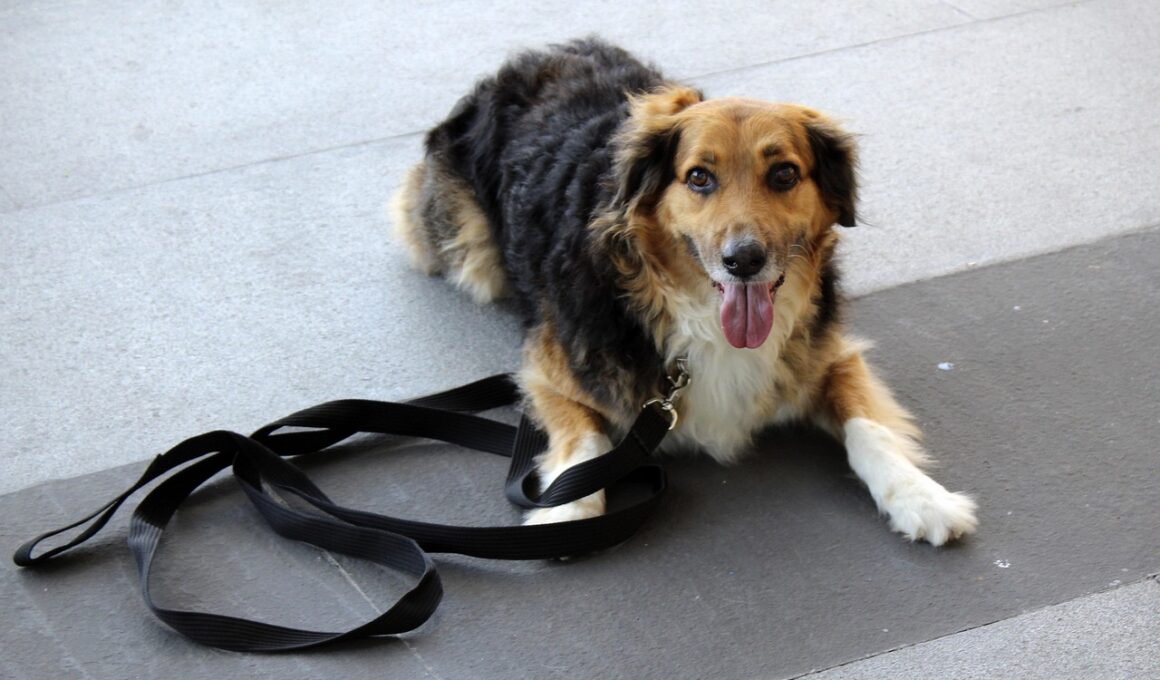How to Improve Your Dog’s Focus and Attention During Trials
Training your dog for obedience trials requires patience and effective techniques. One essential aspect is improving their focus and attention. To achieve this, ensure consistent training practices. Utilize various methods such as positive reinforcement. This involves rewarding your dog with treats or praise for desired behaviors. This approach builds a bond of trust and encourages them to pay attention during trials. Additionally, practice short, frequent training sessions. Dogs often lose concentration during lengthy sessions, so keep them engaging by changing activities. Consider varying environments to help your dog adapt to different settings. This prepares them for trial conditions. Incorporate play to maintain enthusiasm. Engage in fun activities like fetch or tug-of-war before training. This helps expend energy while keeping the atmosphere light. Use commands that are clear and simple, ensuring your dog understands their meaning. Finally, be observant. Recognizing your dog’s signs of distraction helps in redirecting their focus effectively. Consistency, patience, and understanding your dog’s unique needs are vital when working towards strengthening their focus during obedience trials.
Another effective method involves desensitizing your dog to distractions. Gradually exposing them to various stimuli can improve their concentration. Begin in a controlled environment with minimal distractions. Progress to gradually increasing the level of distractions, such as people or sounds. This helps your dog learn to maintain focus amidst busier environments. Use higher value rewards during practice sessions when distractions are introduced. These rewards should be more enticing than typical treats. Over time, your dog will become comfortable with various distractions while staying focused on you. Maintaining an enthusiastic demeanor will encourage your dog as well. Ensure you maintain a cheerful and encouraging tone. This positivity can help them stay motivated and engaged. It’s also essential to ensure your dog is physically comfortable. Tired or hungry dogs tend to lose interest quickly. Always make sure your dog is well-rested and fed appropriately before training sessions. Consistency is key for boosting attention spans. Create a regular training schedule, allowing your dog to anticipate these sessions. Make them a part of your daily routine to solidify your dog’s focus and attention during these critical trials.
Utilizing Obedience Commands
Using obedience commands effectively can also enhance your dog’s focus in trials. Simple commands should be the foundation of training. Basic commands like “sit,” “stay,” and “come” are vital. Practice these commands frequently to reinforce their importance. Always reward your dog after successfully following a command. This positive reinforcement encourages them to remain focused. Gradually increase the level of difficulty. Start with fewer distractions before moving to more challenging environments. Teach your dog to respond consistently, regardless of external factors. Incorporating hand signals alongside verbal commands can also aid focus. Visual clues make it easier for some dogs to respond, enhancing their attention. Practice these commands in various settings, including parks or crowded places. This exposure helps the dog learn to concentrate on you among distractions. Make training enjoyable by incorporating play. Use toys or games to keep your sessions upbeat. This encourages your dog to maintain focus while having fun. Always aim for clarity in your commands. Ensure your voice is strong and confident during training. This instills trust in your dog, leading to better focus during obedience trials.
Creating a structured environment can be particularly beneficial for maintaining your dog’s focus. Having a predictable atmosphere reduces anxiety and distractions. Designate a specific area for training where your dog feels comfortable. This familiarity enhances their engagement and willingness to participate. Introduce routines that your dog can associate with training sessions. This may include a specific warm-up or exercise sequence to prepare them mentally. Incorporate engaging activities such as agility exercises or puzzles. These can sharpen their mental acuity and improve their focus. Furthermore, consider lowering the volume of noises in the training environment. Excessive sounds can easily distract your dog, so use quiet spaces whenever possible. Gradually increase noise levels as your dog becomes more confident in focusing. Ensure they understand the purpose of the session clearly. Clear objectives and expectations can significantly enhance their performance. Always conclude training on a positive note. Finish each session with a fun activity or a reward. End on a high note encourages your dog to look forward to future practice. Practicing these techniques consistently will progressively improve your dog’s focus and attention.
Socialization and Teamwork
Socialization plays a critical role in developing your dog’s focus and attentiveness during trials. Exposing your dog to various environments, people, and other dogs helps them become well-adjusted. It reduces anxiety when in unfamiliar settings, allowing better focus during obedience tasks. Schedule playdates or group training sessions for socialization opportunities. This helps them learn to interact appropriately while retaining focus on tasks. Encourage teamwork between you and your dog. Establishing a strong bond enhances trust, ensuring your dog is attentive to your commands. Regular bonding activities strengthen this connection, such as spending time together outside of training. Positive experiences together lead to a deeper understanding, improving your dog’s performance in trials. Use interactive games that require teamwork, fostering collaboration while keeping your dog engaged. Training classes can also provide valuable socialization experiences. These environments expose your dog to distractions and help reinforce their focus amidst numerous stimuli. Ensure regular contact with other dogs and people to enhance their social skills. Each successful interaction builds their confidence, leading to improved focus in trials. Remember, a well-socialized and confident dog will perform better under trial conditions.
In addition, fostering mental stimulation can greatly influence your dog’s attention span during trials. Engaging their minds keeps them active and promotes focus. Various activities can contribute to their mental enrichment, such as puzzle toys and scent games. These not only entertain but also challenge your dog, enhancing their problem-solving abilities. Regularly provide toys that encourage thinking and creativity. Rotate toys to maintain their interest and engagement. Mental play sessions, combined with physical activity, create a well-rounded training experience. Consider introducing new skills or tasks regularly to prevent boredom. Training tricks can be a fun way to ensure your dog remains mentally alert. Teaching them to perform new commands or tricks promotes focus and attentiveness. Use short, engaging sessions for trick training since they require both physical and mental efforts. Always maintain a positive and encouraging demeanor to motivate your dog. Praise and rewards are essential during these practices. Having fun in training fosters a sense of enjoyment. Enjoyment will keep their spirits high and help with maintaining focus. Creating mentally stimulating experiences coupled with physical activities increases your dog’s hope and success during trials.
Monitoring Progress and Adjusting Techniques
Continuously monitoring and adjusting techniques is pivotal in improving your dog’s focus in obedience trials. Regular assessments of your dog’s progress provide invaluable insights. Observe their reactions during training sessions. Identify moments when they successfully maintain focus and times they become distracted. Modify your approach accordingly to address specific challenges they encounter. Documenting your experiences can be beneficial. Keep a training journal to track your dog’s performance over time. This documentation helps identify patterns and the effectiveness of different training methods. If a particular strategy isn’t producing results, don’t hesitate to switch it. Experiment with various techniques to find what suits your dog best. Being flexible in your training methods allows you to cater to their unique needs. Seek advice or involvement from professional trainers if necessary. They can provide personalized guidance based on your dog’s behavior. Joining a community of dog trainers or enthusiasts is also a fantastic way to learn and share experiences. Engaging with others helps expand your knowledge and improve the training methods you implement. Remember to celebrate small victories; improvement comes with time and persistence.


